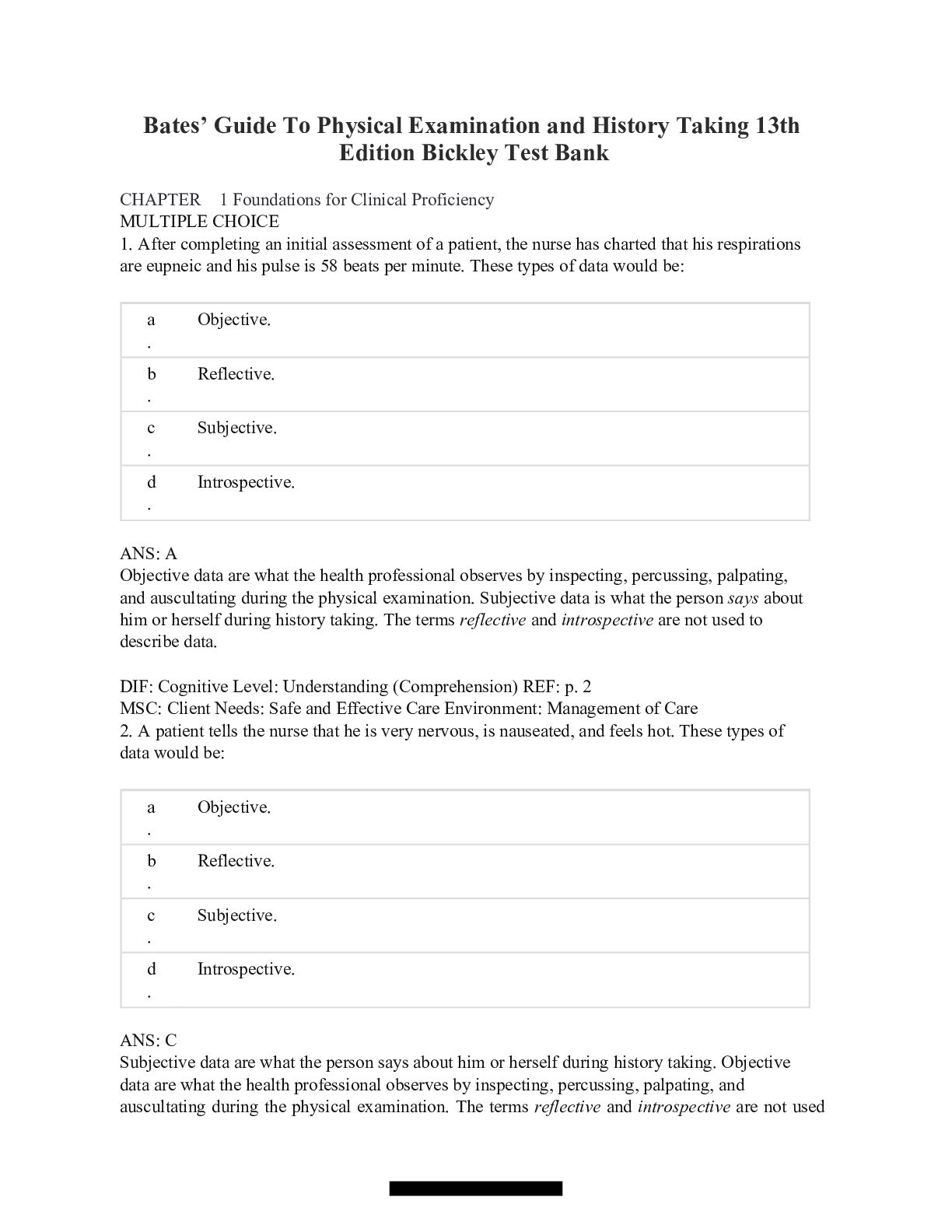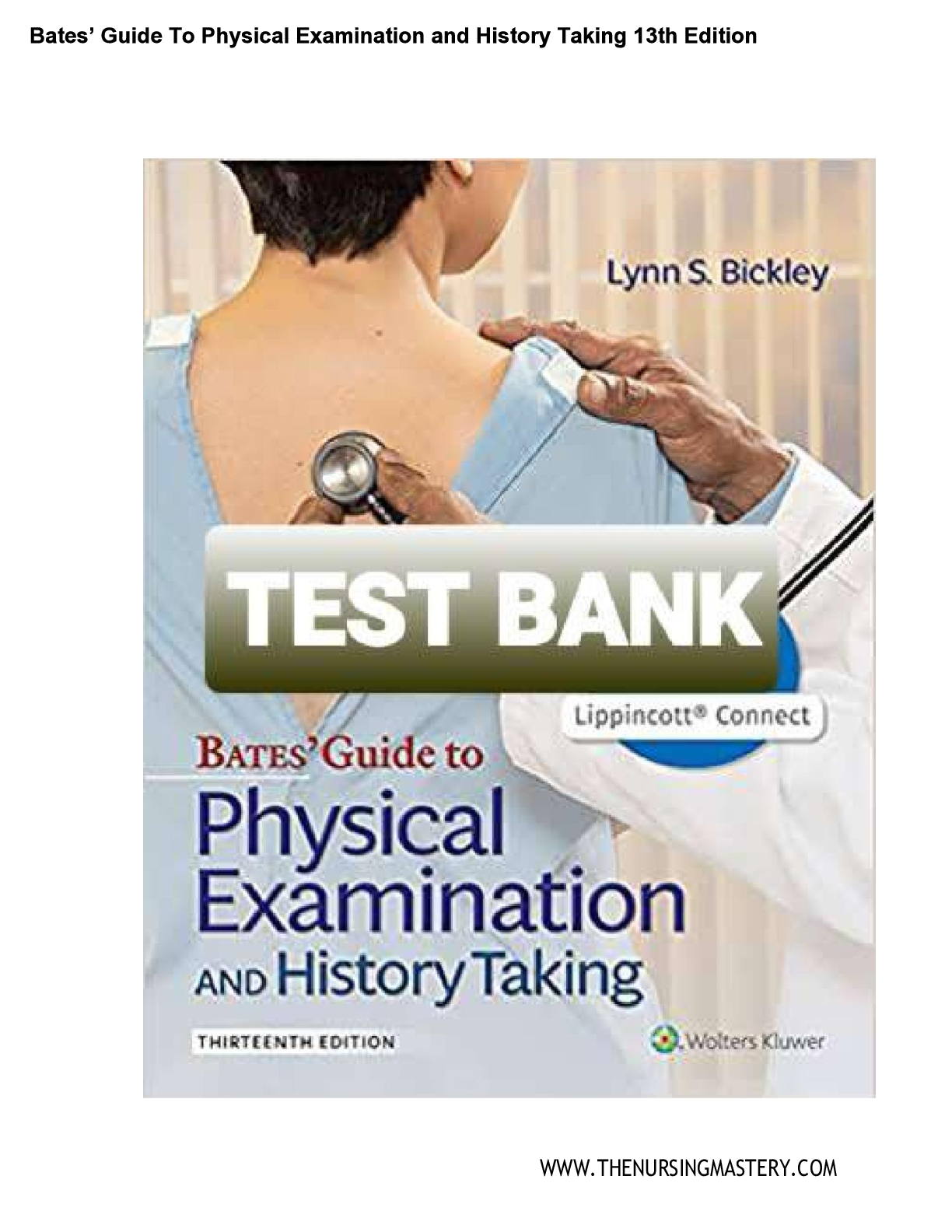Seidel's Guide to Physical Examination 9th Edition Ball Test Bank
Document Content and Description Below
MULTIPLE CHOICE 1. Which statement is true regarding the relationship of physical characteristics and culture? a. Physical characteristics should be used to identify members of cultural groups. b. ... There is a difference between distinguishing cultural characteristics and distinguishing physical characteristics. c. To be a member of a specific culture, an individual must have certain identifiable physical characteristics. d. Gender and race are the two essential physical characteristics used to identify cultural groups. ANS: B Physical characteristics are not used to identify cultural groups; there is a difference between the two, and they are considered separately. Physical characteristics should not be used to identify members of cultural groups. To be a member of a specific culture, an individual does not need to have certain identifiable physical characteristics. You should not confuse physical characteristics with cultural characteristics. Gender and race are physical characteristics, not cultural characteristics, and are not used to identify cultural groups. DIF: Cognitive Level: Understanding (Comprehension) OBJ: Nursing process—assessment MSC: Physiologic Integrity: Physiologic Adaptation 2. An image of any group that rejects its potential for originality or individuality is known as a(n): a. acculturation. b. norm. c. stereotype. d. ethnos. ANS: C A fixed image of any group that rejects its potential for originality or individuality is the definition of stereotype. Acculturation is the process of adopting another culture’s behaviors. A norm is a standard of allowable behavior within a group. Ethnos implies the same race or nationality. DIF: Cognitive Level: Remembering (Knowledge) OBJ: Nursing process—assessment MSC: Physiologic Integrity: Physiologic Adaptation 3. Mr. L presents to the clinic with severe groin pain and a history of kidney stones. Mr. L’s son tells you that for religious reasons, his father wishes to keep any stone that is passed into the urine filter that he has been using. What is your most appropriate response? a. “With your father’s permission, we will examine the stone and request that it be returned to him.” b. “The stone must be sent to the lab for examination and therefore cannot be kept.” Seidels Guide To Physical Examination 9th Edition Ball Test Bank Full Download: http://alibabadownload.com/product/seidels-guide-to-physical-examination-9th-edition-ball-test-bank/ This sample only, Download all chapters at: alibabadownload.com This study source was downloaded by 100000823742721 from CourseHero.com on 10-07-2022 04:30:24 GMT -05:00 https://www.coursehero.com/file/64727195/seidels-guide-to-physical-examination-9th-edition-ball-test-bankpdf/ c. “We cannot let him keep his stone because it violates our infection control policy.” d. “We don’t know yet if your father has another kidney stone, so we must analyze this one.” ANS: A We should be willing to modify the delivery of health care in a manner that is respectful and in keeping with the patient’s cultural background. “With your father’s permission, we will examine the stone and request that it be returned to him” is the most appropriate response. “The stone must be sent to the lab for examination and therefore cannot be kept” and “We don’t know yet if your father has another kidney stone, so we must analyze this one” do not support the patient’s request. “We cannot let him keep his stone because it violates our infection control policy” does not provide a reason that it would violate an infection control policy. DIF: Cognitive Level: Analyzing (Analysis) OBJ: Nursing process—assessment MSC: Physiologic Integrity: Physiologic Adaptation 4. The motivation of the healthcare professional to “want to” engage in the process of becoming culturally competent, not “have to,” is called: a. cultural knowledge. b. cultural awareness c. cultural desire d. cultural skill. ANS: C Cultural encounters are the continuous process of interacting with patients from culturally diverse backgrounds to validate, refine, or modify existing values, beliefs, and practices about a cultural group and to develop cultural desire, cultural awareness, cultural skill, and cultural knowledge. Cultural awareness is deliberate self-examination and in-depth exploration of one’s biases, stereotypes, prejudices, assumptions, and “-isms” that one holds about individuals and groups who are different from them. Cultural knowledge is the process of seeking and obtaining a sound educational base about culturally and ethnically diverse groups. Cultural skill is the ability to collect culturally relevant data regarding the patient’s presenting problem, as well as accurately performing a culturally based physical assessment in a culturally sensitive manner. Cultural desire is the motivation of the healthcare professional to want to engage in the process of becoming culturally competent, not have to. DIF: Cognitive Level: Understanding (Comprehension) OBJ: Nursing process—assessment MSC: Physiologic Integrity: Physiologic Adaptation 5. Mr. Marks is a 66-year-old patient who presents for a physical examination to the clinic. Which question has the most potential for exploring a patient’s cultural beliefs related to a health problem? a. “How often do you have medical examinations?” b. “What is your age, race, and educational level?” c. “What types of symptoms have you been having?” d. “Why do you think you are having these symptoms?” This study source was downloaded by 100000823742721 from CourseHero.com on 10-07-2022 04:30:24 GMT -05:00 https://www.coursehero.com/file/64727195/seidels-guide-to-physical-examination-9th-edition-ball-test-bankpdf/ ANS: D “Why do you think you are having these symptoms?” is an open-ended question that avoids stereotyping, is sensitive and respectful toward the individual, and allows for cultural data to be exchanged. The other questions do not explore the patient’s cultural beliefs about health problems. DIF: Cognitive Level: Analyzing (Analysis) OBJ: Nursing process—assessment MSC: Physiologic Integrity: Physiologic Adaptation [Show More]
Last updated: 11 months ago
Preview 1 out of 7 pages

Reviews( 0 )
Document information
Connected school, study & course
About the document
Uploaded On
Oct 07, 2022
Number of pages
7
Written in
Additional information
This document has been written for:
Uploaded
Oct 07, 2022
Downloads
1
Views
139


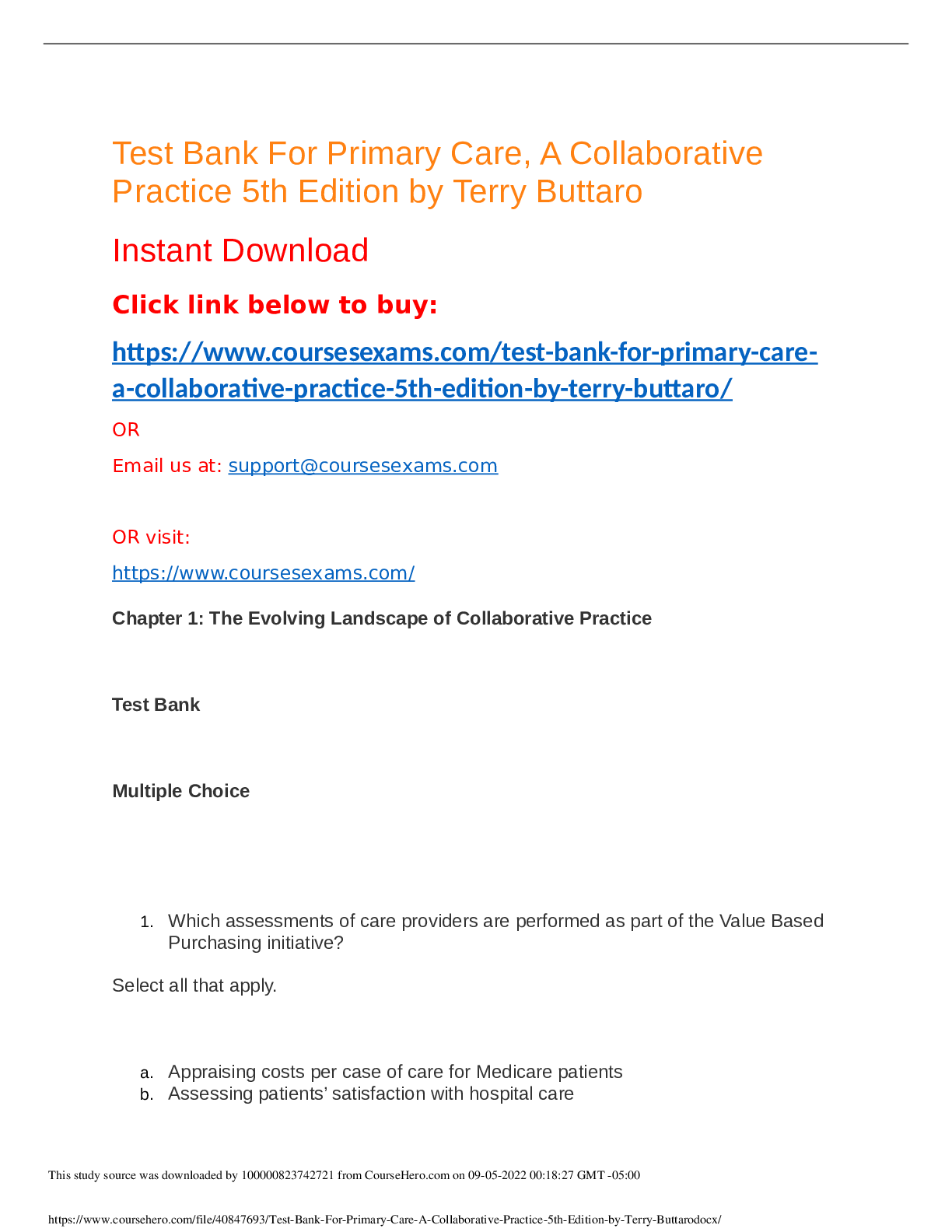


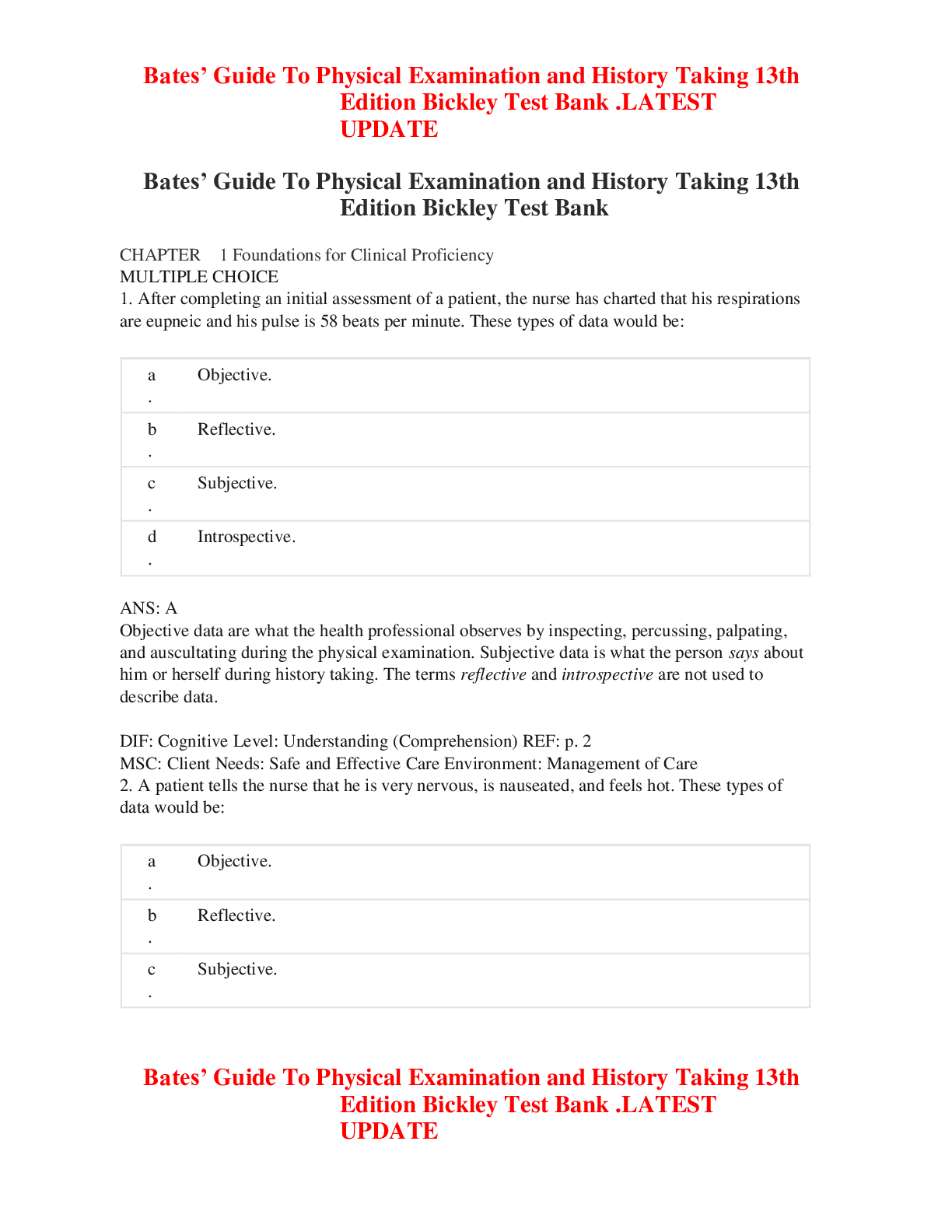
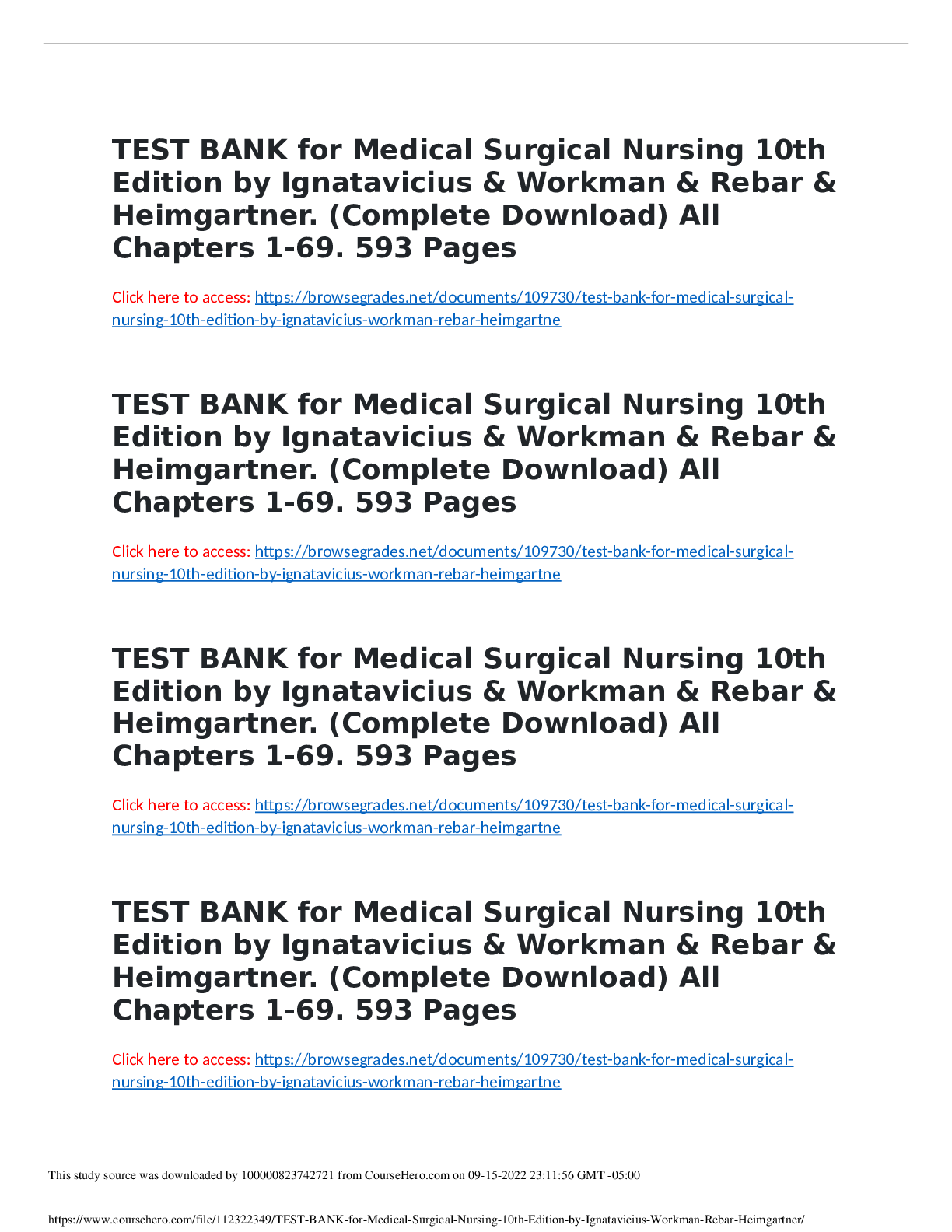
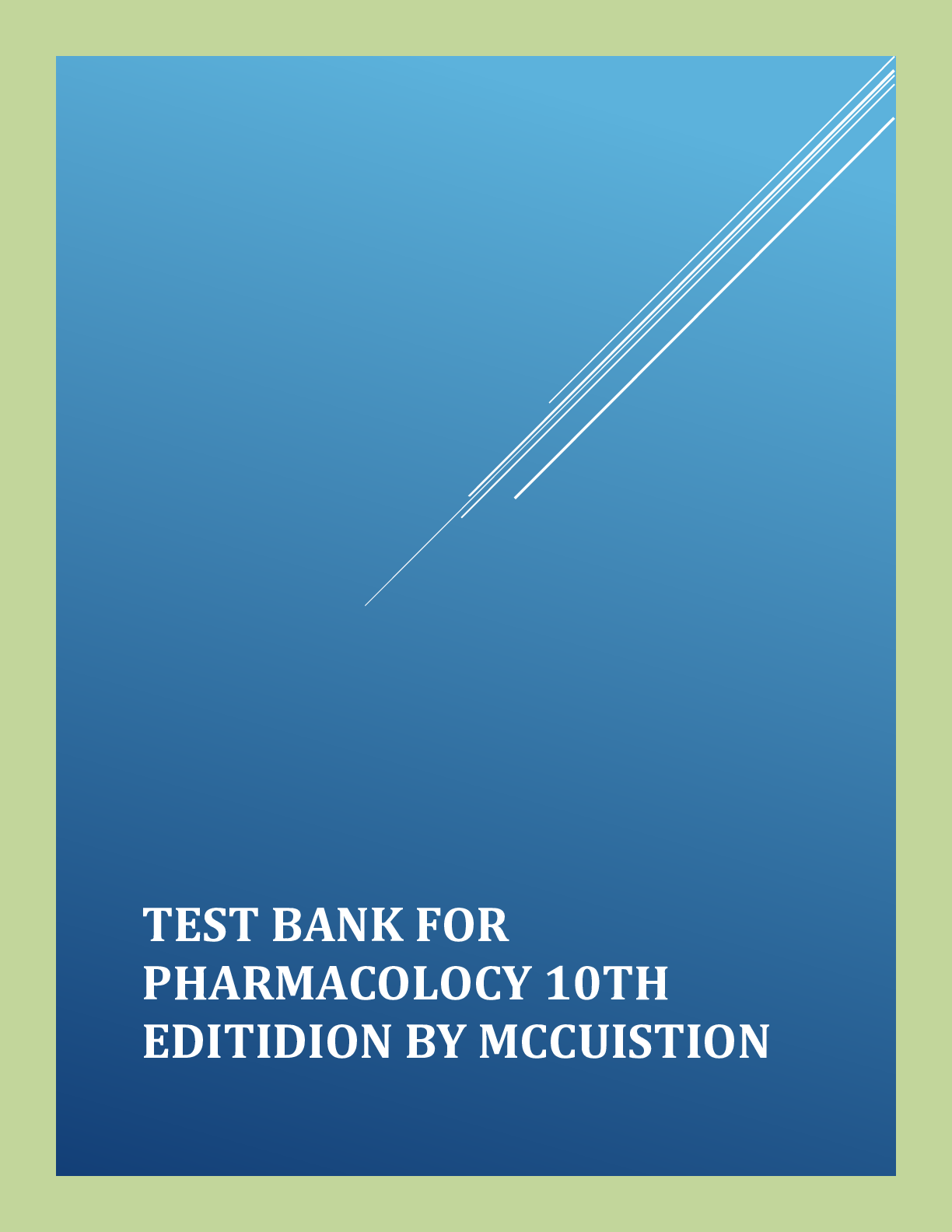


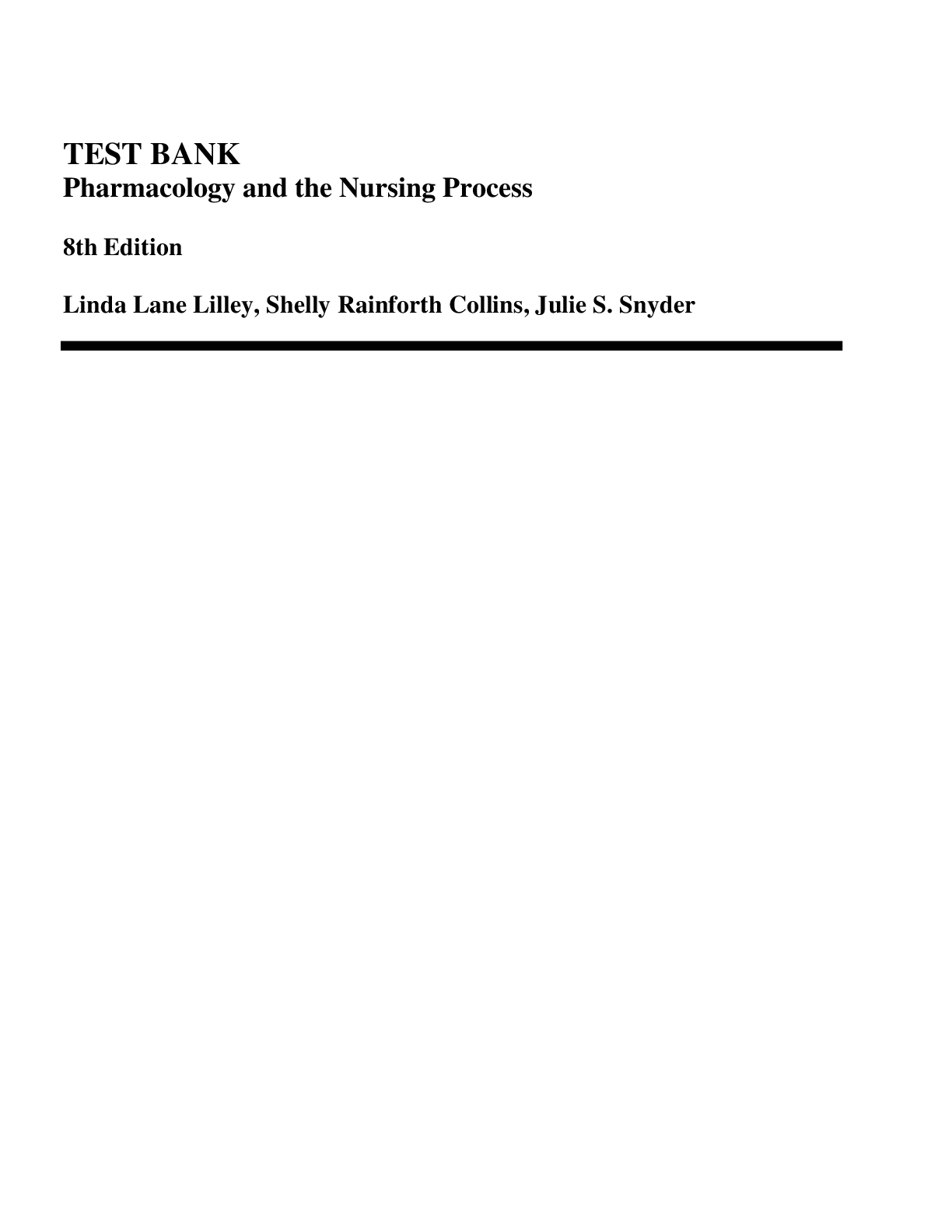



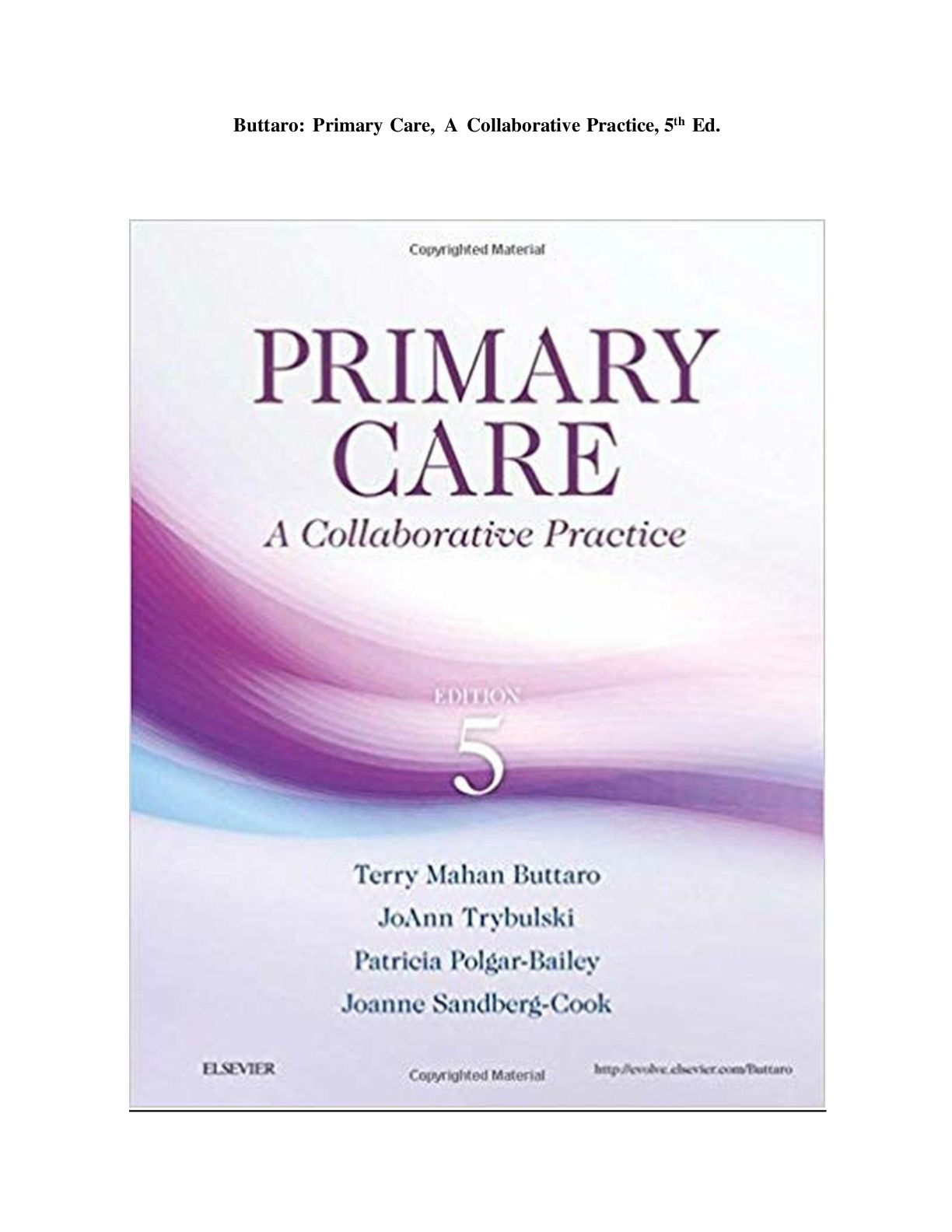

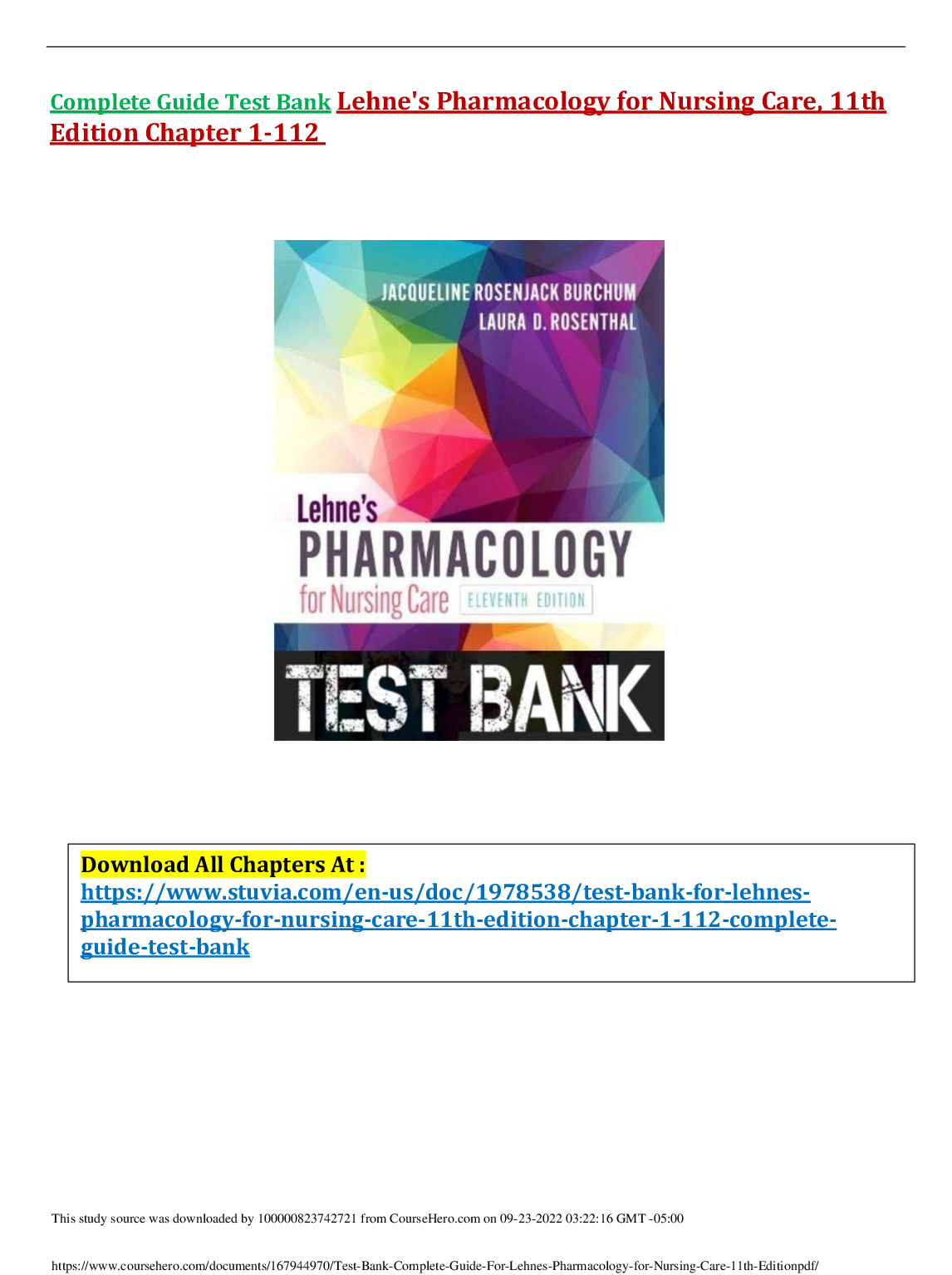




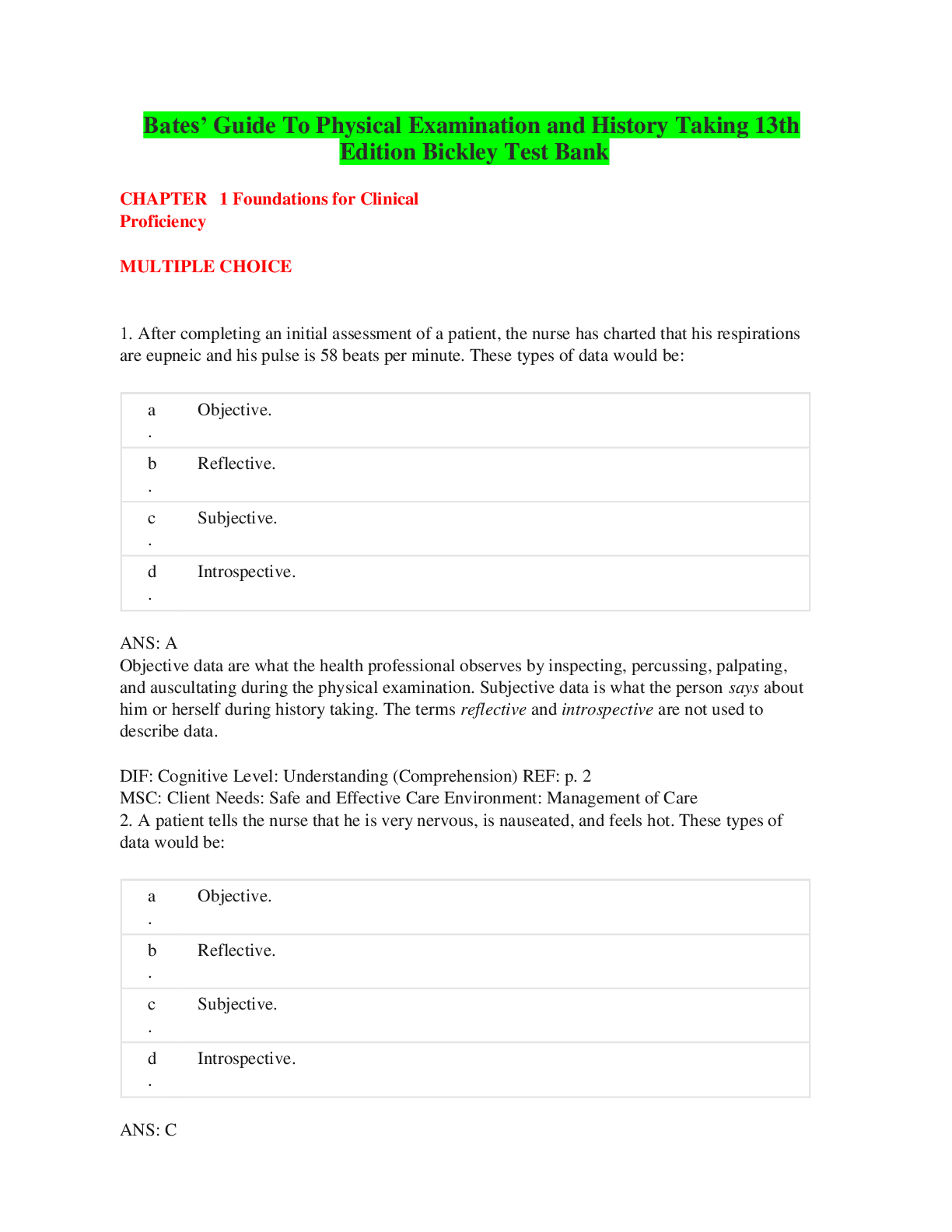
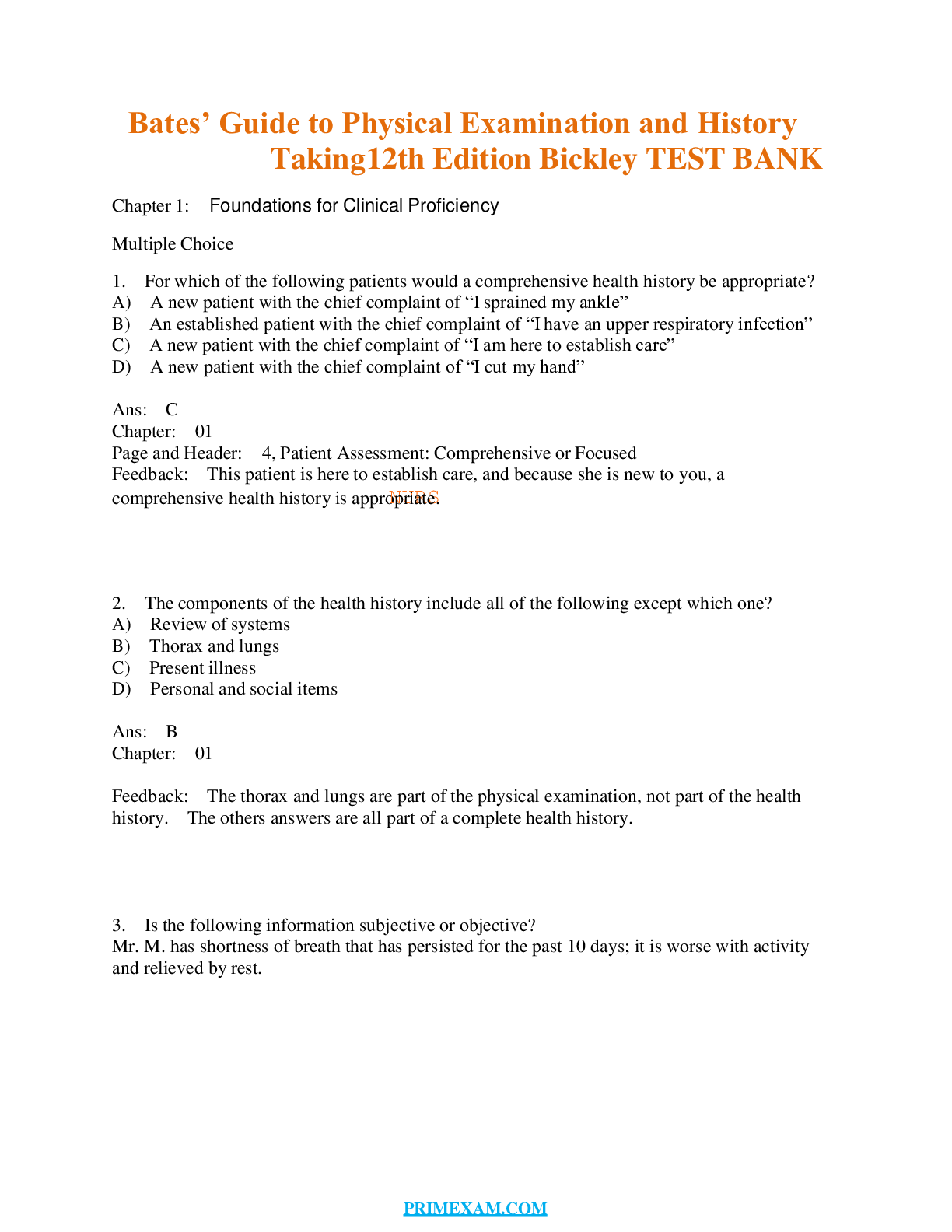
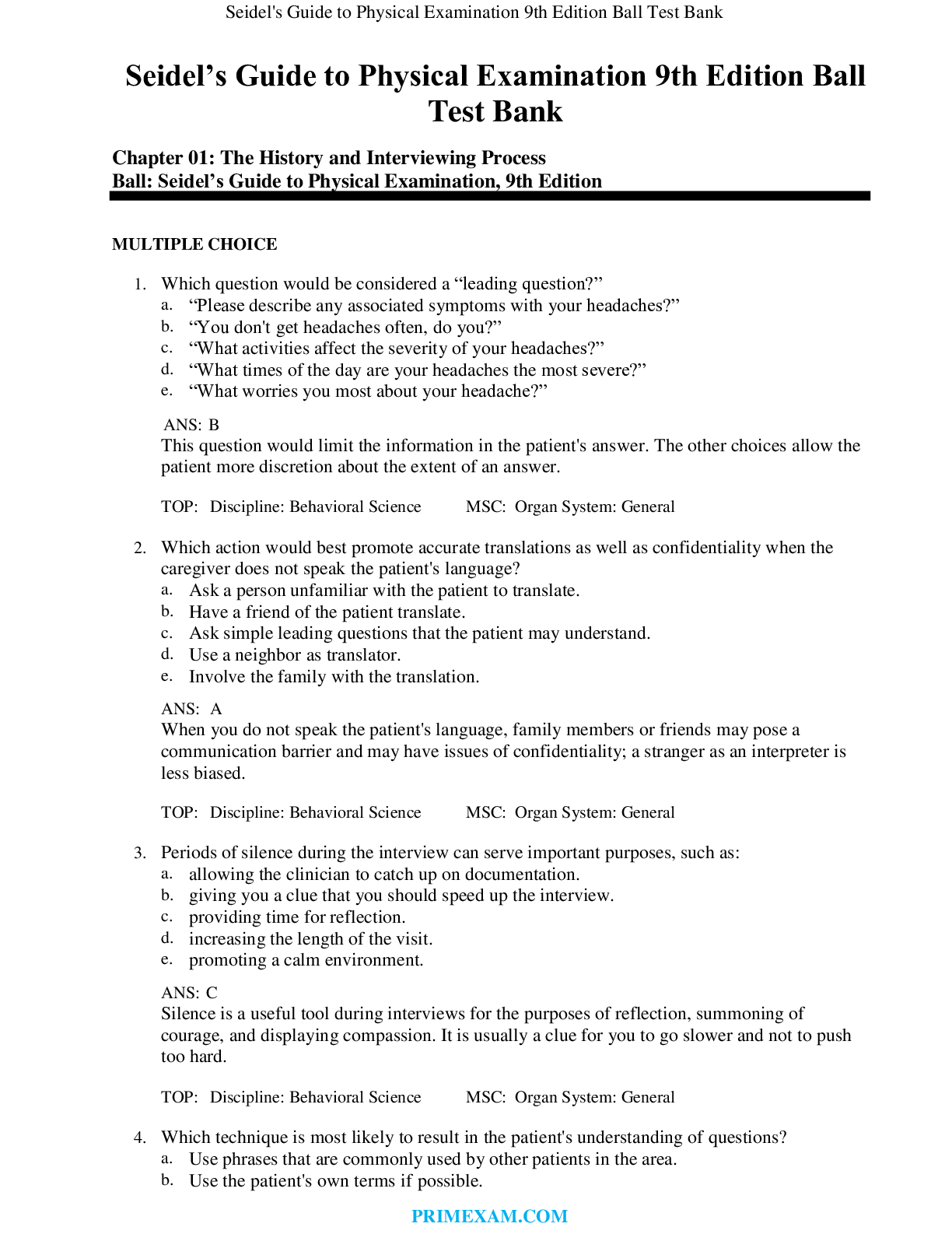
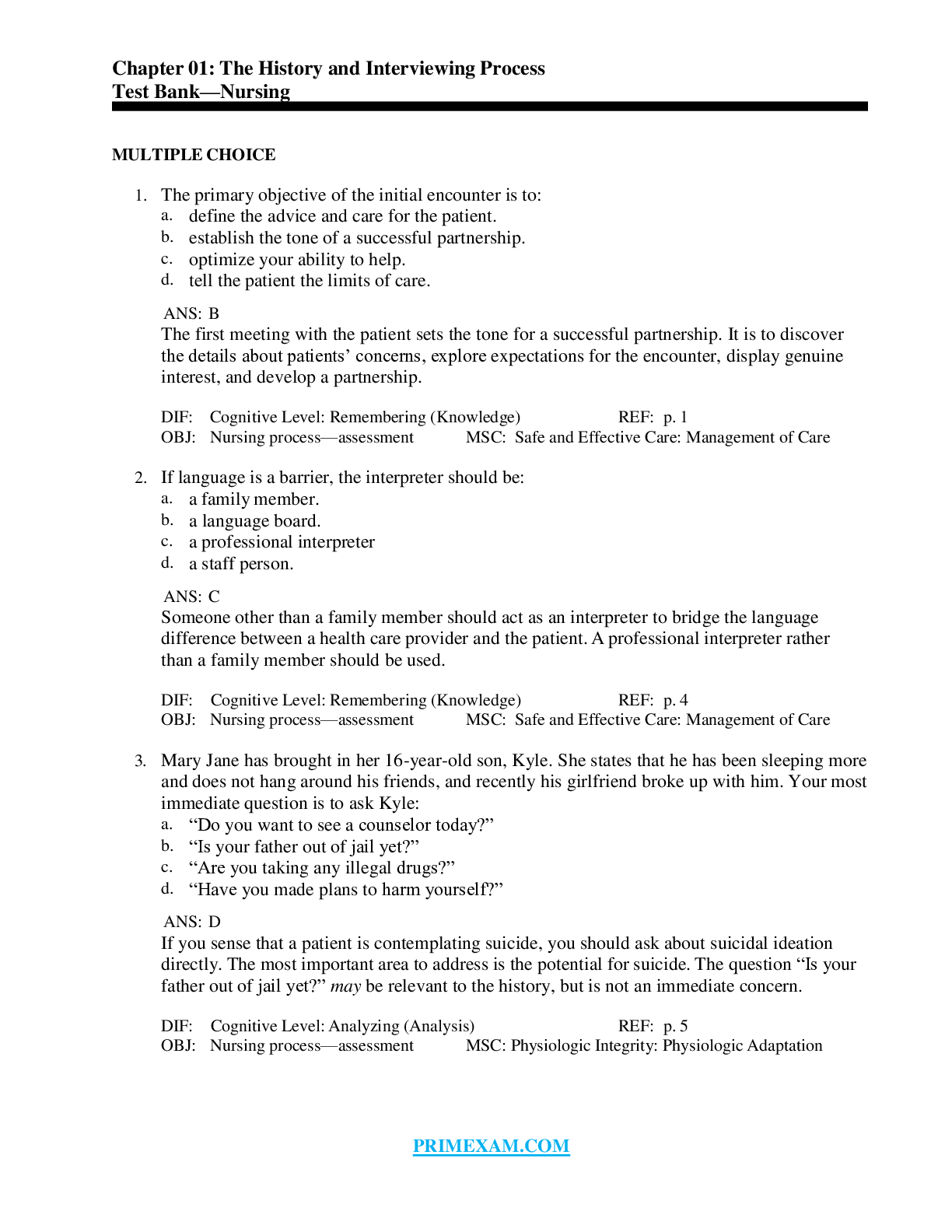
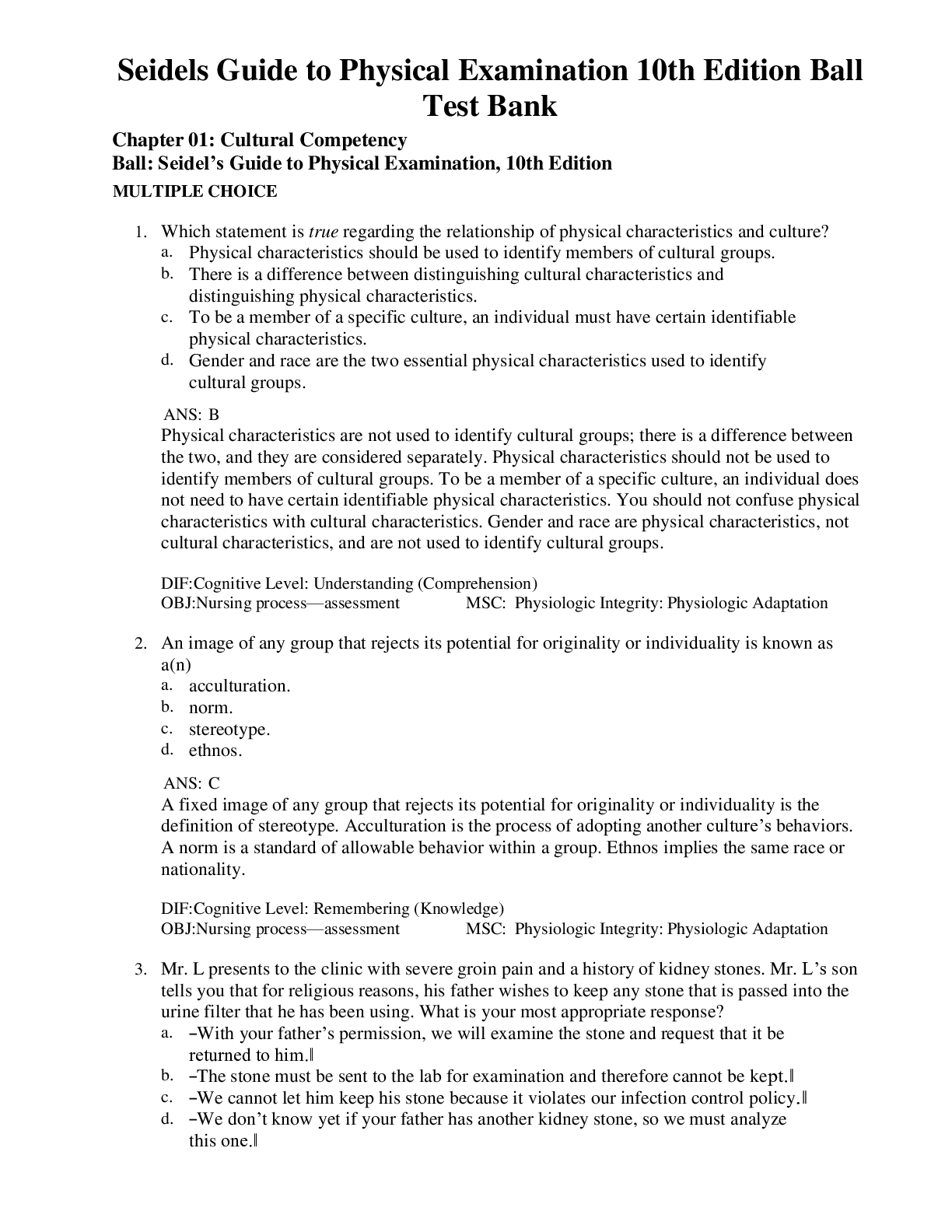
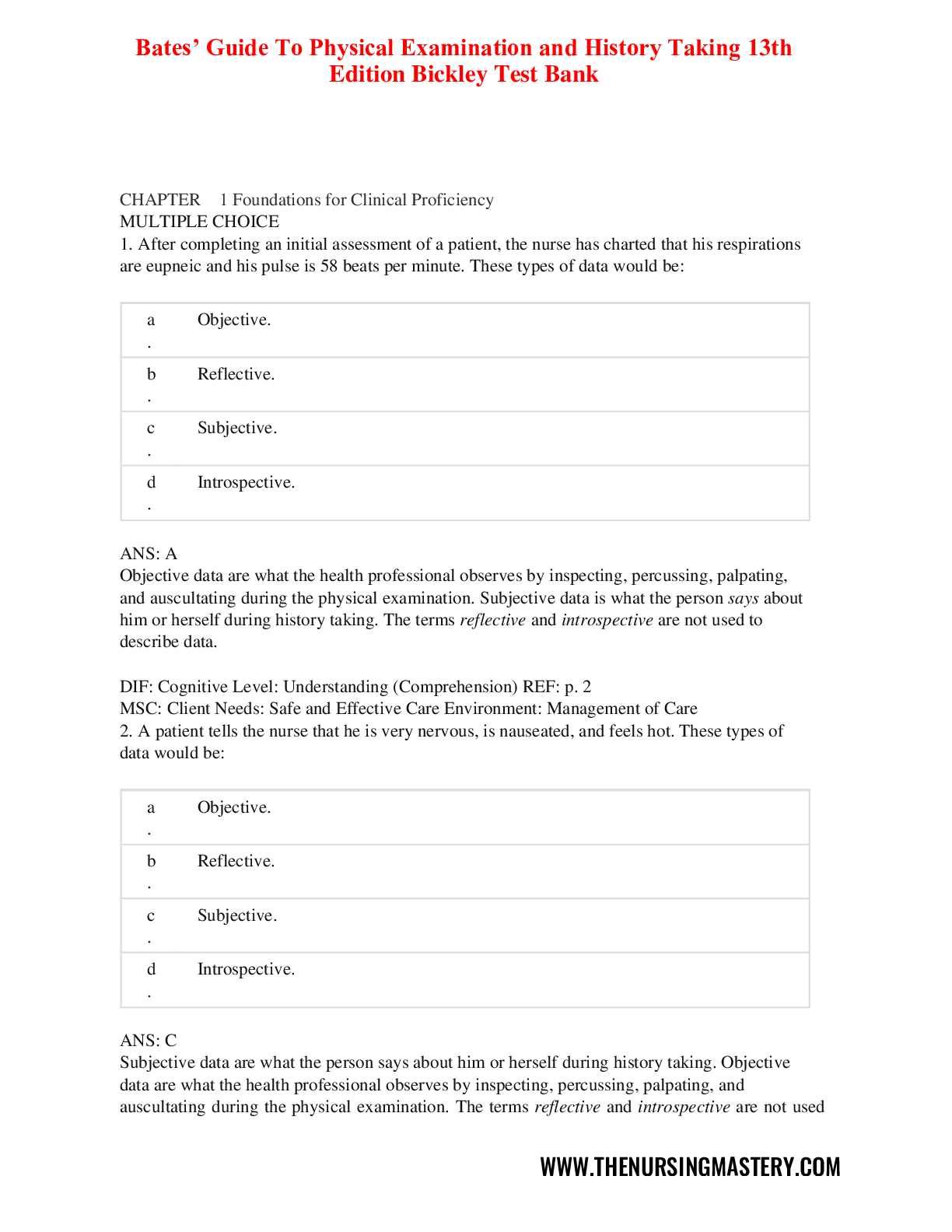
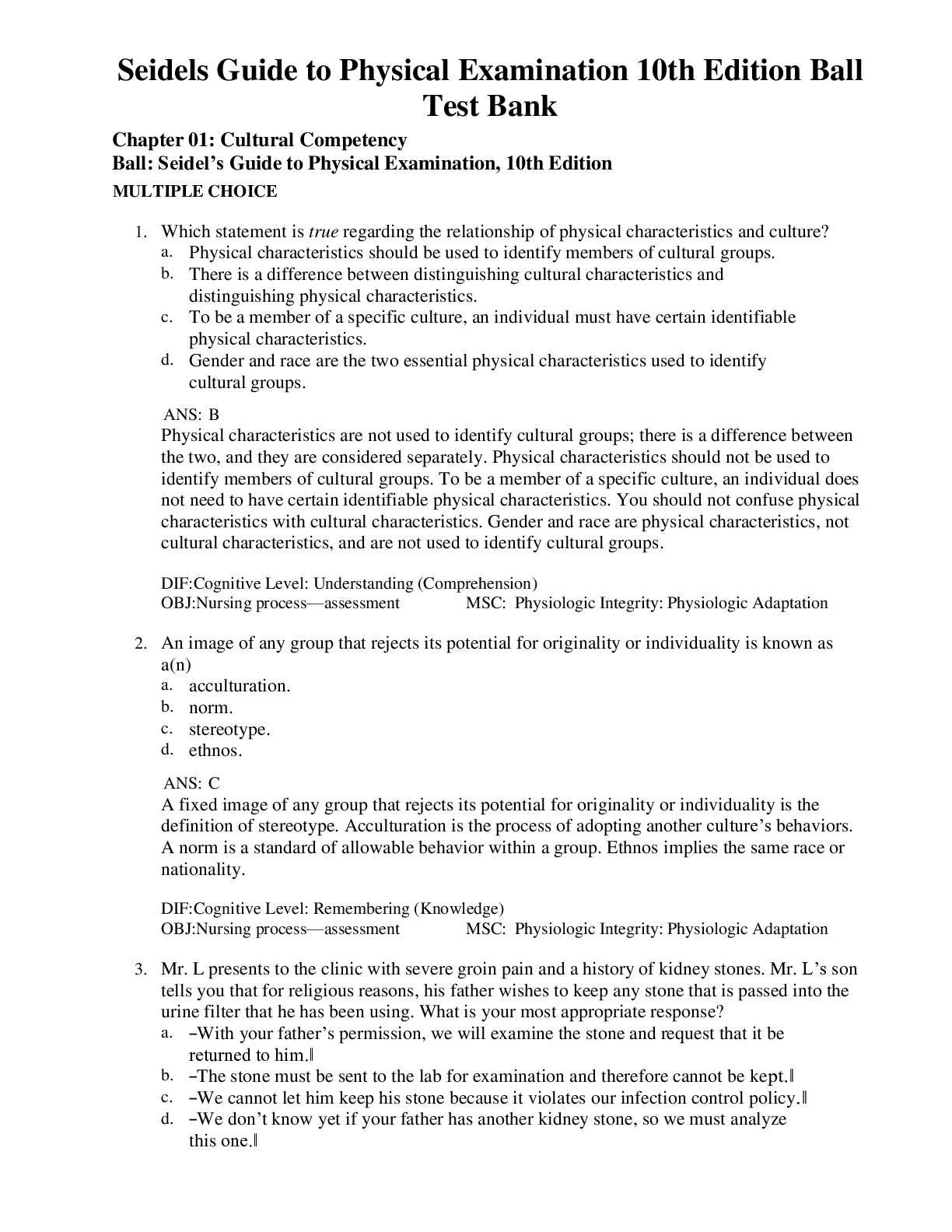
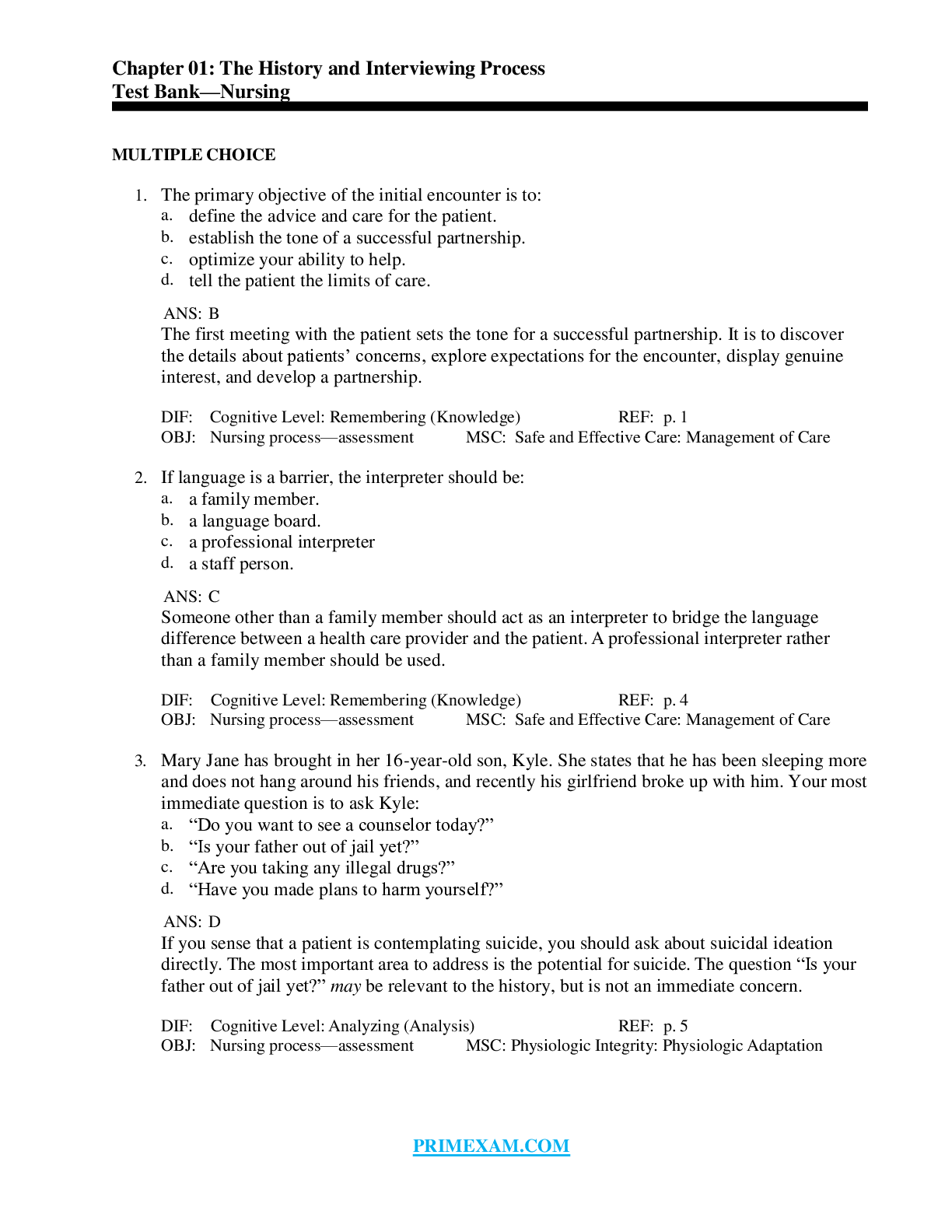
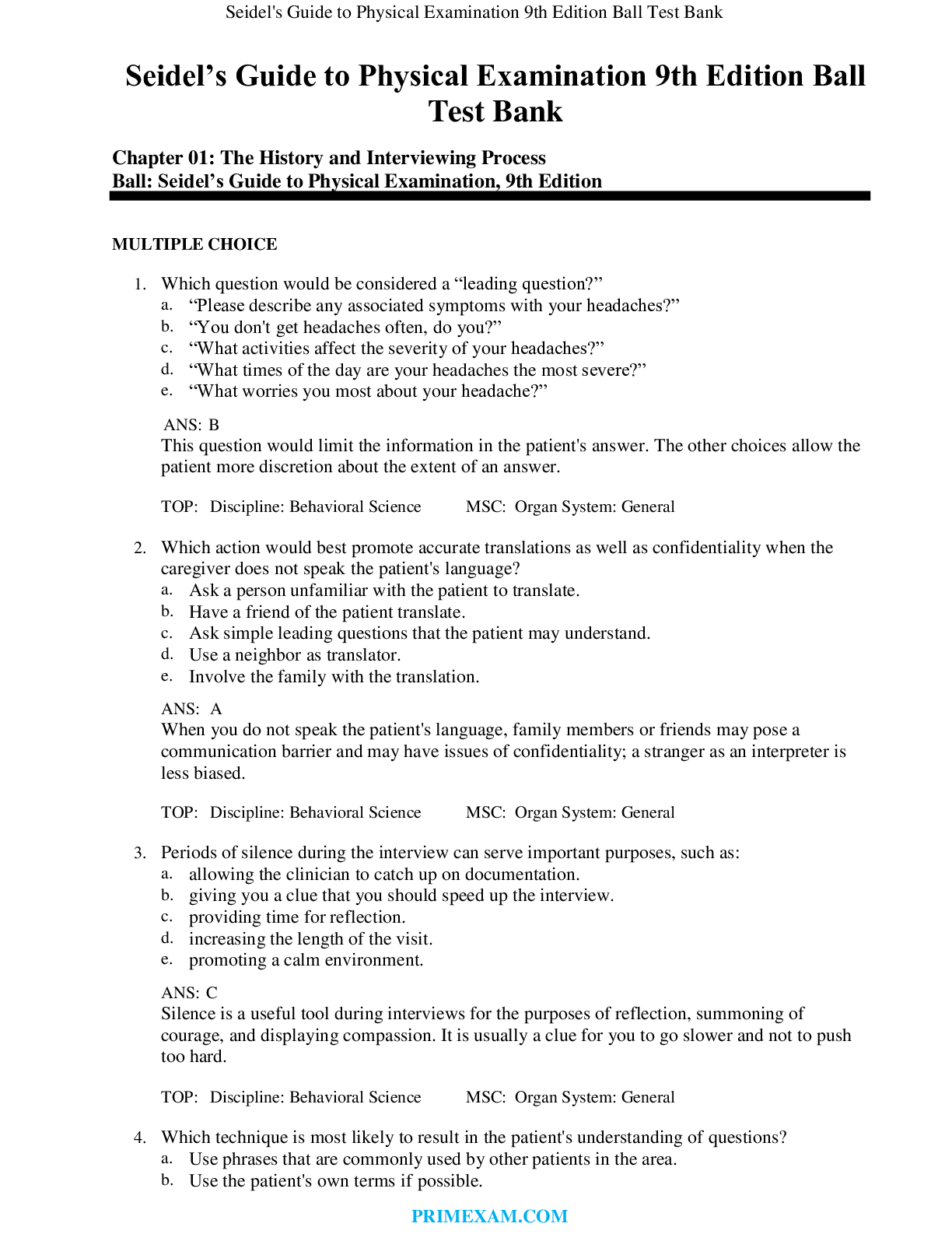
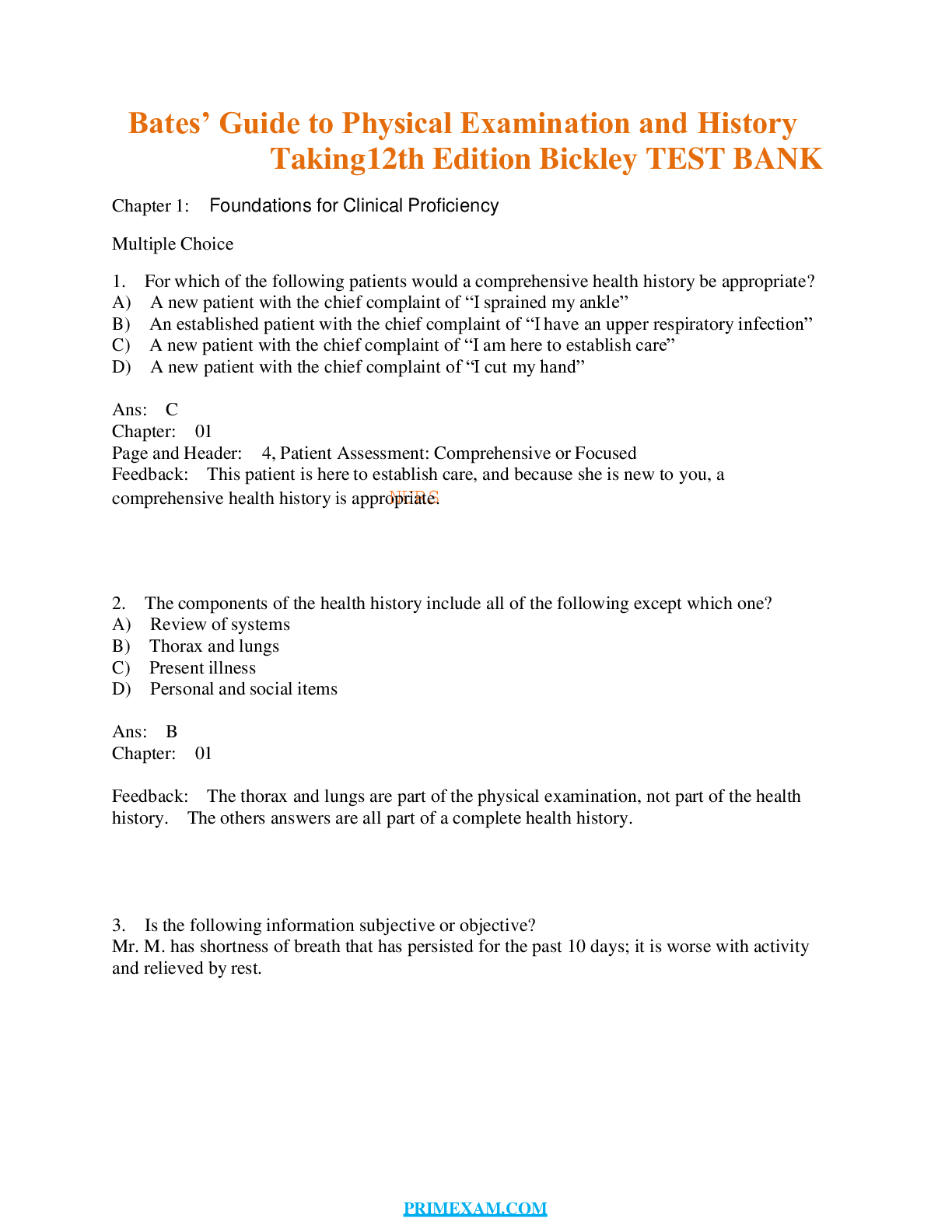

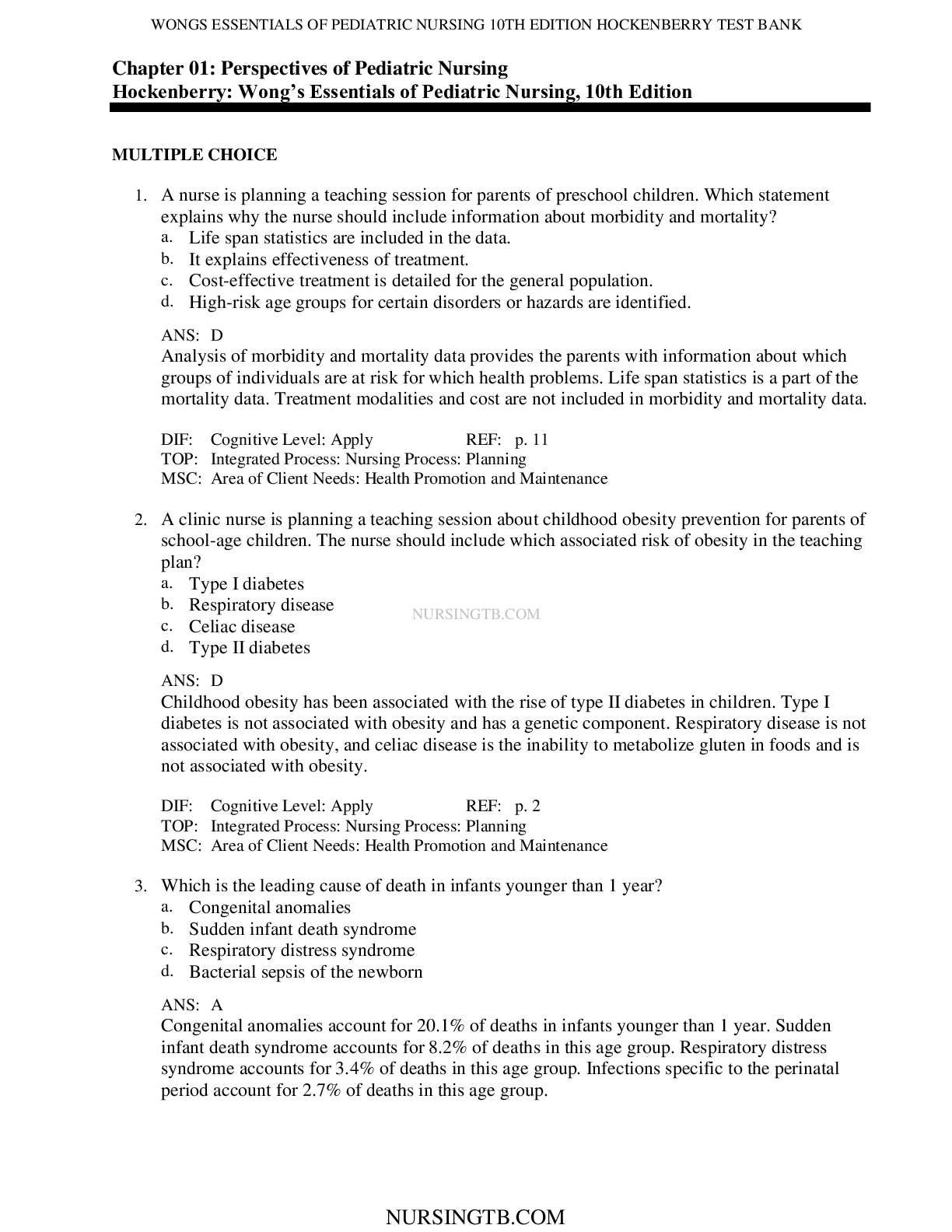
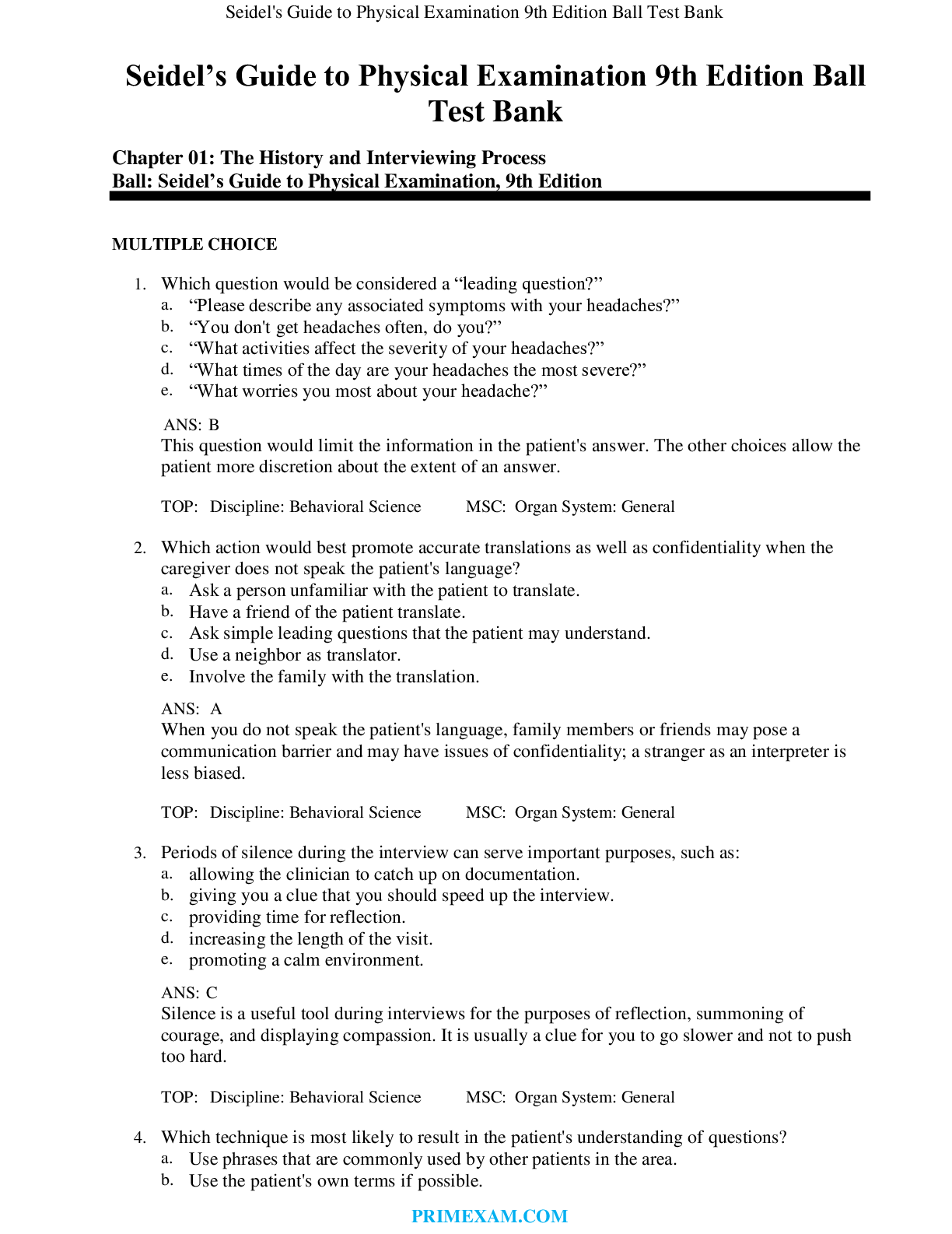
.png)
